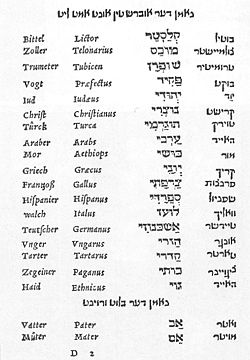- Cush (Bible)
-
Cush (also Kush, Biblical כוש Kûš) was the eldest son of Ham, brother of Mizraim (Egypt), Canaan and the father of Nimrod, and Raamah, mentioned in the "Table of Nations" in the Genesis 10:6 and I Chronicles 1:8. He is traditionally considered the eponymous ancestor of the people of Cush, a dark-skinned people inhabiting the country surrounded by the River Gihon, identified in antiquity with Arabia Felix and Ethiopia.
Hebrew Bible
According to Genesis, Cush's other sons were Seba, Havilah, Sabtah, Raamah, and Sabtecah.
The wife of Moses was a Cushite, according to the Book of Numbers 12:1. Exagoge 60-65 by Ezekiel the Tragedian (fragments reproduced in Eusebius) has Zipporah describe herself to Moses as a stranger in the land of Midian, and proceeds to describe the inhabitants of her ancestral lands in Africa:
"Stranger, this land is called Libya {an ancient name for the African continent}. It is inhabited by tribes of various peoples, Ethiopians, dark men. One man is the ruler of the land: he is both king and general. He rules the state, judges the people, and is priest. This man is my father {Jethro} and theirs."
The rhetorical question "Can the Cushite change his skin?" in Jeremiah 13:23 implies people of a markedly different skin color from the Israelites, probably an African people; also, the Septuagint uniformly translates Cush as Αἰθιοπία "Ethiopia."
Another person named Cush in the Hebrew Bible is a Benjamite who is mentioned only in Psalm 7, and is believed to be a follower of Saul.
Later identifications
Main article: Aethiopia (Classical Greek term)It is possible[citation needed] that the Hebrew name is derived from Kash, the Egyptian name of Lower Nubia and later of the Nubian kingdom at Napata, known as "kingdom of Kush" in modern literature. At the time of the redaction of the Hebrew Bible, and throughout classical antiquity, the Nubian kingdom was centered at Meroe.
Josephus gives an account of the nation of Cush, son of Ham and grandson of Noah: "For of the four sons of Ham, time has not at all hurt the name of Cush; for the Ethiopians, over whom he reigned, are even at this day, both by themselves and by all men in Asia, called Cushites." (Antiquities of the Jews 1.6).
The introduction of the term "Cushitic" for a branch of the Afro-Asiatic language family dates to the 1870s. The Cushitic-speaking peoples today comprise the Somali, Afar, Oromo and several other tribes, and were considered offspring of Cush in Masudi's Meadows of Gold from 947 AD[1] The Beja people, who also speak a Cushitic language, have specific genealogical traditions of descent from Cush[2][3].
The Persian historian Muhammad ibn Jarir al-Tabari (c. 915) recounts a tradition that the wife of Cush was named Qarnabil, daughter of Batawil, son of Tiras, and that she bore him the "Abyssinians, Sindis and Indians".[4]
Scholars like Johann Michaelis and Rosenmuller have pointed out that the name Cush was applied to tracts of country on both sides of the Red Sea in the Arabia (Yemen) and in Africa. In the 5th century AD, the Himyarites in the south of Arabia were styled by Syrian writers as Cushaeans and Ethiopians.
Explorer James Bruce, who visited the Ethiopia highlands c. 1770, wrote of "a tradition among the Abyssinians, which they say they have had since time immemorial", that in the days after the Deluge, Cush, the son of Ham, traveled with his family up the Nile until they reached the Atbara plain, then still uninhabited, from where they could see the Ethiopian table-land. There they ascended and built Axum, and sometime later returned to the lowland, building Meroe. He also states that European scholars of his own day had summarily rejected this account on grounds of their established theory, that Cush must have arrived in Africa via Arabia and the Bab el Mandab.[5] Further, the great obelisk of Axum was said to have been erected by Cush in order to mark his allotted territory, and his son Ityopp'is was said to have been buried there, according to the Book of Aksum, which Bruce asserts was revered throughout Abyssinia equally with the Kebre Negest.
Descendants of Noah in Genesis 10 Shem and Semitic Ham and Hamitic Japheth and Japhetic References
- ^ Masudi's The Meadows of Gold (947 AD); Wahb ibn Munabbih (738) included among Cush's offspring "the "Qaran", the Zaghawa, the Habesha, the Qibt, and the Barbar".
- ^ A History of the Beja Tribes of the Sudan, Andrew Paul, p. 20
- ^ The Peopling of Ancient Egypt and the Deciphering of Meroitic Script, Unesco, p. 54.
- ^ Tabari's Prophets and patriarchs
- ^ Bruce, Travels to Discover the Source of the Nile, p. 305
Categories:- Torah people
- Hebrew Bible nations
- Kingdom of Kush
- Ham (son of Noah)
Wikimedia Foundation. 2010.

